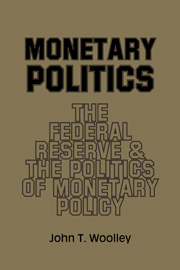Book contents
- Frontmatter
- Contents
- Preface
- 1 The Federal Reserve and the Politics of Monetary Policy: Introduction and Overview
- 2 A Capsule History of the Federal Reserve System
- 3 Recruitment and Selection of Federal Reserve Personnel
- 4 Bankers and the Federal Reserve
- 5 Economists and the Federal Reserve
- 6 The President and the Federal Reserve
- 7 Congress and the Federal Reserve
- 8 Making Monetary Policy in a Political Environment: The Election of 1972
- 9 Monetary Politics: A Summary
- Appendix A A Note on Data Sources
- Appendix B Legislation Included in Table 7.1
- Appendix C Academic Backgrounds and Career Experiences of Notable Monetarists
- Notes
- Bibliographic Note
- Index
4 - Bankers and the Federal Reserve
Published online by Cambridge University Press: 01 June 2011
- Frontmatter
- Contents
- Preface
- 1 The Federal Reserve and the Politics of Monetary Policy: Introduction and Overview
- 2 A Capsule History of the Federal Reserve System
- 3 Recruitment and Selection of Federal Reserve Personnel
- 4 Bankers and the Federal Reserve
- 5 Economists and the Federal Reserve
- 6 The President and the Federal Reserve
- 7 Congress and the Federal Reserve
- 8 Making Monetary Policy in a Political Environment: The Election of 1972
- 9 Monetary Politics: A Summary
- Appendix A A Note on Data Sources
- Appendix B Legislation Included in Table 7.1
- Appendix C Academic Backgrounds and Career Experiences of Notable Monetarists
- Notes
- Bibliographic Note
- Index
Summary
Common sense indicates to many that bankers probably rank quite high among would-be superiors of the Federal Reserve. They control money, organization, information, and expertise. This view is reinforced by several analysts who have suggested that bankers are indeed a very important reference group for the Federal Reserve. This perspective is held by analysts from different ends of the ideological spectrum, who see two kinds of problems that result. The first problem, one that interests principally liberal analysts, is that the System's relationship with bankers may restrict and bias the policy process further in the direction of elite values. Thus, with respect to goals for general policy targets such as inflation and employment, this relationship might reduce further the likelihood that the Federal Reserve would regard employment as the most important objective.
The second set of problems, which have been of more concern for relatively conservative analysts, has to do with the ability of bankers to shape policy at a technical level. In this case, analysts fear that bankers' short-term policy preferences make it less likely that policy makers will achieve control over the money supply – which is viewed as essential to effective anti-inflation policy. Not surprisingly, the conservatives have exactly the opposite fear of the liberals. The conservatives fear that bankers' influence will produce more inflation, not more unemployment.
- Type
- Chapter
- Information
- Monetary PoliticsThe Federal Reserve and the Politics of Monetary Policy, pp. 69 - 87Publisher: Cambridge University PressPrint publication year: 1984



